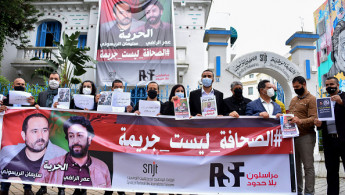Morocco rejects Radi, Raissouni appeal, keeps journalists behind bars
Morocco's top court has rejected the final appeals of two journalists, Omar Radi and Soulaimane Raissouni, imprisoned on sexual assault charges they deny, their lawyer said on Wednesday.
The court of cassation in Rabat on Tuesday "rejected our appeal and confirmed the prison sentences" of the two men who have been behind bars since 2021, lawyer Miloud Kandil told AFP.
Radi, 37, was handed a six-year prison term and Raissouni, 51, a five-year sentence in trials that defence lawyers labelled "flawed".
محكمة النقض بالرباط تؤيد الأحكام بالسجن ضد الصحفيين المغربيين #عمر_الراضي و #سليمان_الريسوني و ترفض الطعن بالنقض المقدم من طرفهما.
— Khaled Drareni (@khaleddrareni) July 19, 2023
La Cour de cassation de Rabat rejette les pourvois en cassation introduits par les journalistes marocains Omar Radi et Soulaimane Raissouni et… pic.twitter.com/2NjwDkPrrl
Human Rights Watch has accused Morocco of using criminal trials, especially for alleged sexual offences, as "techniques of repression" to silence journalists and government critics.
Authorities in the North African kingdom say the journalists were tried for common law crimes which "have nothing to do" with their profession or free speech.
Radi's father told AFP that the family had "expected this decision despite the countless irregularities" that had marred the judicial procedure.
"We know that justice is not independent in this case, but we hope for a royal pardon to close this file, which has damaged the image of our country so much," added Driss Radi.
Lawyers for jailed Moroccan journalists and rights defenders had earlier urged the authorities to find a "judicial, political and legal solution" so that the two journalists could be freed.
They had warned that their prison conditions "do not respect basic rights" and threaten their health.
The watchdog group Reporters Without Borders (RSF) ranks Morocco 144th out of 180 countries in its latest World Press Freedom Index, down nine positions from 2022.
Khaled Drareni, RSF's North Africa representative, said about the latest court ruling that "the signal sent is a disastrous one".
Feminist lawyer Aicha Guella, president of victims' rights group AMVD, welcomed the ruling and charged that Radi and Raissouni and their supporters "are trying to politicise these cases when the facts have been established in court".
Radi, an investigative journalist who has written about official corruption, was arrested and charged in July 2020.
He was prosecuted for "undermining the internal security of the state" and accepting foreign financing and, in a separate case, for the "rape" of a former colleague who rejected his claim that they had consensual relations.
Raissouni, an editorialist who has been critical of the authorities, was prosecuted on "sexual assault" charges brought by a young LGBTQ activist, which he has denied.
He was arrested in May 2020 but did not attend most of his initial trial between February and July 2021 because he was on a 122-day hunger strike.
The court also upheld the conviction and one-year jail term of another journalist, Imad Stitou, who had been a defence witness in Radi's trial but was then himself charged for "failure to assist a person in danger".
Stitou, who had backed Radi's testimony in court, left Morocco and was tried in absentia.





 Follow the Middle East's top stories in English at The New Arab on Google News
Follow the Middle East's top stories in English at The New Arab on Google News


